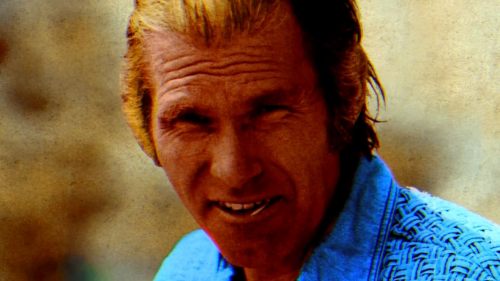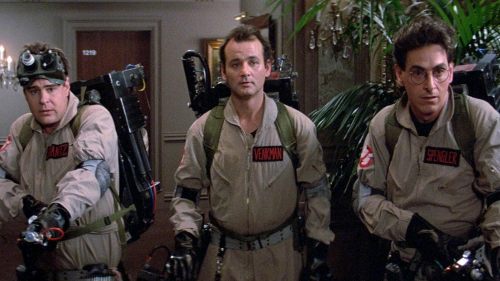Collins’ Crypt: THE ENTITY, Based On A Novel That Was Based On A Real Haunting
I first saw The Entity in 2010 as one of my Horror Movie A Day entries, and as was often the case when I noticed a film I enjoyed (or was at least intrigued by) was based on a novel, made a note to check out the source material when time allowed, only to forget about it due to the billions of other things that occupy my time. But I recently found Frank DeFelitta's original novel on one of my bookstore rummages, and with the new Blu-ray from Scream Factory coming (today!), I figured it was not only time to revisit the film (which I hadn't seen since, so I had basically forgotten everything about it) but also read the book and see how it compared.
The plot, for those unaware (and just as a warning, rape is involved) is about a woman named Carlotta Moran (simply Carla in the film, played by Barbara Hershey) who is raising three children and struggling to make ends meet living in a Los Angeles suburb. One night, presented as any other night at home, she is smacked across the face by an unseen enemy, and then thrown onto her bed, at which point her head is covered with a pillow (to smother her cries for help) as she is sexually assaulted. Because of the pillow (and in the movie's case, the angle staying on her covered face), she believes an intruder attacked her, and asks her son Billy to look around for him, but he is unable to find anyone - and the windows remain shut/locked to boot. The following night it happens again, only this time her face isn't covered and she realizes that this isn't a flesh and blood person attacking her, but some kind of malevolent spirit.
As the attacks continue and are even witnessed by her children and her best friend, she seeks help, first from a local university psychiatrist named Schneidermann (Ron Silver in the film), and then a pair of parapsychologists who are more prone to believe her claims of "spectral rape" than Schneidermann, who believes her to be simply in need of professional help. Both novel and film attempt to provide plausible explanations for how these attacks could all be in her mind, though it's not fully successful (though, naturally, the book does a better job at it - in the movie we can see for ourselves it's really a ghost), and ultimately the parapsychologists bring her to their lab so that they can attempt to trap the entity with liquid nitrogen.

Until that point, the movie changes very little from De Felitta's book, and most of those alterations are of little significance. In the book, Billy's father began using drugs and acting recklessly after the child was born and he felt like he was losing his wife, as she became a "mom" that no longer wanted to engage in physical activity with him. This behavior ultimately led to his death from a motorcycle accident, which is how his absence is explained in the movie - where Carla also notes that he died before Billy was even born. And when she first meets the parapsychologists (in a bookstore, overhearing them discussing a possible haunting), the film incarnations are skeptical of her claims at first, whereas in the novel they practically jump at the opportunity and are on her side instantly. These minor diversions are of little consequence in the long run, and since DeFelitta adapted the novel himself (as he did for his earlier Audrey Rose), I can't imagine anyone taking issue with them.
However, as mentioned, the movie had to leave a lot of things out (as opposed to *changing* them), which may be more frustrating to pre-existing fans of the novel who sat down to watch the movie. The Schneidermann character in particular has far less to do in the film, which primarily focuses on Carla and rarely leaves her side for another perspective. In the novel, we spend quite a bit of time with him, learning about how he gradually dropped his other cases to focus exclusively on her case, much to the chagrin of his boss/mentor Dr. Weber (who, as we learn, also became someone overly attached to a patient and nearly wrecked his career over it, and now fears Schneidermann is going down the same path). As her condition worsens and she seeks more spiritually driven help, he and Weber turn downright antagonistic, attempting to sabotage their tests and get their department removed from the university; we're even treated to a lengthy scene where the university's entire roster has a hearing and then a vote as to whether or not the "ghost guys" can keep their lab space.
Carla's own history is also whittled down to a few lines of dialogue; things that got full blown flashbacks in the novel are summed up with a line or two. In addition to the aforementioned part of her life with Billy's father, we're also given a look at her time with Bob Garrett, another older man who became the father of her two daughters before he too passed away (from a heart attack), as well as her adolescence as the unwanted only child of a strict minister and a mother who was basically devoid of any real emotion at all. It was this unloving environment that sent her into the arms of not just boys, but MEN who could help her work out her understandable father issues and drive a deeper wedge between her and her mother, who she continued to be estranged from even after her father's death. At one point in the novel she considers moving back in with her mother for the sake of her children, only to chicken out at the driveway, though the mother ultimately visits her at the hospital near the end.

It's no surprise that these things got excised, but I was rather stunned to see how big of a part Carla's boyfriend Jerry played in the novel's proceedings, as he is reduced to a single sequence in the film (played by Alex Rocco in what amounts to a cameo). The book treats us not only to their courtship (he was a traveling businessman who kept making excuses to visit the bar where she sold cigarettes whenever he was in Los Angeles) but he pops up on occasion to give the poor woman a few days' worth of relaxation and love. He wants to marry her, but Billy's icy relationship with him (which came to blows on one occasion, before the ghost showed up) has him unsure about making that leap, and (as with the film) she hides her dilemma from him so he won't think she's crazy, which gives him all kinds of other doubts as he can tell something's wrong. You really feel bad for the guy, especially with what happens to him (arrested for trying to attack the ghost after witnessing an attack - Billy and of course the cops think he was suddenly attacking HER), but in the movie he just appears once after a few mentions and exits just as quickly. As with Schneidermann, you get the idea that they wanted to simplify things by focusing almost exclusively on her perspective, forcing a reduction of his significance, but I had to wonder why DeFelitta just didn't write him out entirely.
As for the ending, maybe DeFelitta opted to change it himself or maybe he was forced to (we can't ask him; he died in 2016, though in interviews he seemed pleased with the film), but either way the film's version is happier (spoilers ahead!), as Carla and the doctors manage to freeze the entity and return her life to normalcy, with the closing scene showing her cheerfully moving away with her children in tow. In the book, the final test is inconclusive; the believers and skeptics all saw (and heard) the entity and the havoc it caused at the lab, but were left with no hard proof of its existence. Worse, Carla suffers a psychotic break as a result and becomes catatonic, losing her children (to her mother) and being committed as she can no longer take care of herself. Over time she starts speaking again and performing basic functions while under the care of Schneidermann, but she still has a long way to go and is still being tormented by the spirit. It's a real bummer especially after nearly 500 pages; I think an ending where she just died would be less of a downer as we'd be able to assume she was at peace, at least.

Of course, there is a third version of this story: the true one that DeFelitta was basing it on in the first place. A woman named Doris Blither reported being assaulted by a ghost and brought in paranormal experts who agreed that there was some kind of energy in the house, though other than some unexplained lights never saw anything as violent as she reported (or that their fictionalized counterparts witnessed). Blither's lengthy history of drug and alcohol abuse, confirmed mental issues, and contradictory reports from her children have me thinking that the "real" story was little more than the delusions of a very disturbed mind (the house still stands in Los Angeles, and the owners have never had any problems), but the film uses its on-screen text epilogue to inform us that the "real Carla" was still being haunted, albeit not as much. Blither passed away in the 1990s and her case never reached the same sort of attention as the Amityville or Perron family hauntings, plus the novel never mentions the real case at all despite using it as its inspiration (the chance bookstore meeting was taken from reality, as were other details), so you have to really dig to get any info on her, though the Blu-ray has a featurette with one of the researchers who met with her.
Due to the length you really have to commit yourself to the novel as opposed to settling for the two hour movie, but it's undeniably the better version - you get a more fleshed out version of the protagonist, and since the other characters are more developed, you get a break from her attacks (you're also spared the visuals) when you spend time with them. The ending, while ultimately depressing, is also more satisfying and fully formed, as opposed to the film's version which seems to be in a rush to be done with itself (Schneidermann is denied any real comeuppance for his skepticism, nor does he apologize - he just exits unceremoniously). That said, Hershey's performance and Sidney J. Furie's energetic direction (lots of canted angles and diopter shots!) give the film an energy the book sometimes lacks, especially when it gets into the science stuff (lots of lines like "We may have difficulties in assessing the influences from 60 cycle noise and radio frequency interference"). My advice: watch the film and if you enjoy it enough, track down the book to get the "extended edition" of the story. But if you hate the film, I can't imagine the novel changing your mind - it's just a lot more of what you already saw.



